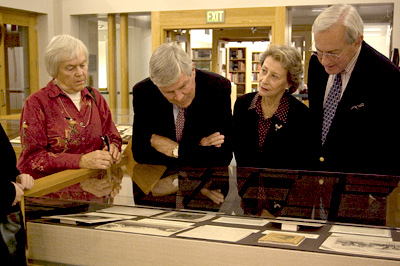Expert: Lincoln stretched Constitution to preserve the U.S.
By Gwen Glazer

Abraham Lincoln experienced a "steep learning curve" as commander in chief as he faced a nation that was ripping itself apart in a civil war, said historian James McPherson to a standing-room-only crowd at Cornell University Library's Rudin lecture Oct. 20.
The lecture launched the library's celebration of the bicentennial of Lincoln's birth and the new exhibition "The Lincoln Presidency: Last Full Measure of Devotion" in Kroch Library.
Addressing an audience of hundreds in Hollis Cornell Auditorium, Goldwin Smith Hall, McPherson detailed three functions of a wartime president -- policy, national strategy and military strategy -- and analyzed how Lincoln carried out those functions in his talk "Stretching the Constitution: Abraham Lincoln as Commander in Chief."
"Lincoln had to suppress any sign of making this war for the Union a war against slavery" at the beginning of the Civil War, McPherson said.
He outlined Lincoln's use of war powers, noting, "both the phrase and the idea of war powers seem to have been Lincoln's own." The Emancipation Proclamation and the suspension of the writ of habeas corpus were the two most prominent examples, and no court overturned either one while Lincoln was alive.
McPherson noted that Lincoln's strategies to preserve the nation sometimes stretched the Constitution, but in the end, he succeeded in upholding the Constitution and keeping the country intact.
"As someone who doesn't know much about Civil War history, I found it fascinating," said Nate Schorr '12. "He was a really illuminating, accessible speaker."
McPherson won the Pulitzer Prize for his 1988 book "Battle Cry of Freedom." His lecture was made possible by a gift from Gail '56 and Stephen Rudin.
After the lecture, the Lincoln exhibition opened. It highlights the library's extensive collection of materials relating to Lincoln and the Civil War, including original copies of the Gettysburg Address, the Emancipation Proclamation and the 13th Amendment.
"No other institutional collection features all three of these documents that shaped our country's most sacred values," University Librarian Anne Kenney said in her introduction at the lecture.
The exhibition includes a playbill from Ford's Theater on the night Lincoln was assassinated; a sketchbook of photographs documenting everyday life in the military camps and the devastation in the wake of the war's major battles; and a miniature pamphlet of the Emancipation Proclamation that was produced and distributed to Union soldiers to ensure that Lincoln's freeing of the slaves would be widely known.
Introducing McPherson, Provost Kent Fuchs noted that that the exhibition is "a powerful reminder of the breadth and scope and depth" of the library's collections.
The exhibition, sponsored by a grant from the Nicholas H. Noyes Jr. Memorial Foundation, runs through April 2010. For hours and more information, visit the library's Web site at http://rmc.library.cornell.edu/lincoln.
Gwen Glazer is the staff writer for Library Communications.
Media Contact
Get Cornell news delivered right to your inbox.
Subscribe